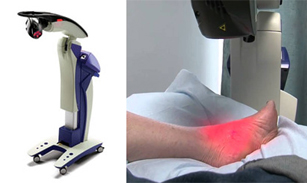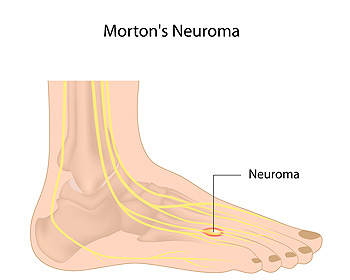Items filtered by date: July 2019
All About MLS Laser Therapy
 MLS laser therapy is an innovative method for treating pain. The concentration of lasers that are used, stimulate the body’s own healing process. The wavelengths may be able to replace surgery or medication, or they can help people recover quickly after surgery. This form of therapy has been known to help with arthritis, sprains, and inflammation. If you have Achilles tendonitis, plantar fasciitis, or another foot injury, MLS laser therapy could be a solution. For some patients, this therapy is the only treatment they use, claiming that a series of appointments keeps their pain manageable. For people with arthritis, this could help ease the long-term effects of the ailment. The lasers do not burn or hurt the skin, with most patients only feeling a slight warming sensation at the site of the treatment. If you have a foot or ankle condition that you believe may improve with MLS laser therapy, be sure to contact a podiatrist.
MLS laser therapy is an innovative method for treating pain. The concentration of lasers that are used, stimulate the body’s own healing process. The wavelengths may be able to replace surgery or medication, or they can help people recover quickly after surgery. This form of therapy has been known to help with arthritis, sprains, and inflammation. If you have Achilles tendonitis, plantar fasciitis, or another foot injury, MLS laser therapy could be a solution. For some patients, this therapy is the only treatment they use, claiming that a series of appointments keeps their pain manageable. For people with arthritis, this could help ease the long-term effects of the ailment. The lasers do not burn or hurt the skin, with most patients only feeling a slight warming sensation at the site of the treatment. If you have a foot or ankle condition that you believe may improve with MLS laser therapy, be sure to contact a podiatrist.
MLS Laser Therapy is a successful alternative for treating any pain you may be experiencing related to certain podiatric conditions. If you are interested in MLS Laser Therapy, consult with Dr. Ronald Sheppard from Warren-Watchung Podiatry Center. Our doctor will assess your condition and provide you with quality foot and ankle treatment.
MLS Laser Therapy
Multiwave Locked System (MLS) Laser Therapy is a patented, FDA-cleared technology that helps relieve pain and inflammation from a number of podiatric conditions, including:
- Heel Pain
- Plantar Fasciitis
- Sports Injuries
- Wounds
- Achilles Tendonitis
- Arthritis
- Neuropathy
- Neuromas
MLS Laser Therapy is an ideal alternative to surgery and prescription medication, as it has no negative side effects and encourages accelerated healing. Among its many clinical benefits, MLS Laser Therapy also:
- Reduces swelling due to bruising or inflammation
- Blocks pain
- Reduces formation of scar tissue
- Improves nerve function
If you have any questions, please feel free to contact one of our offices located in Marlboro and Watchung, NJ . We offer the newest diagnostic and treatment technologies for all your foot care needs.
What is Arthritis?
In the foot, arthritis causes inflammatio n and swelling of the cartilage and in the lining of the joints. Arthritic feet can result in a loss of mobility and independence, but early diagnosis will help significantly. Besides showing up hereditarily, some other causes of arthritis include bacterial and viral infections in the joints, ignored injuries in athletes and industrial workers, and bowel disorders such as colitis and ileitis that lead to arthritis. The three main types of arthritis most often found in the foot are osteoarthritis, rheumatoid arthritis and gout. The symptoms to look for in arthritis are swelling in one or more of the joints, recurring pain or tenderness, redness or stiffness in the joints and any skin changes or rashes. There are also several treatments available for arthritis in the feet. These include physical therapy and foot exercises, aspirin and orthotics. Surgery would be a last resort option if the joints in the foot are extensively damaged and need to be replaced with artificial joints. If you feel you are developing some sort of arthritis in your feet, it is advised that you consult with a podiatrist.
n and swelling of the cartilage and in the lining of the joints. Arthritic feet can result in a loss of mobility and independence, but early diagnosis will help significantly. Besides showing up hereditarily, some other causes of arthritis include bacterial and viral infections in the joints, ignored injuries in athletes and industrial workers, and bowel disorders such as colitis and ileitis that lead to arthritis. The three main types of arthritis most often found in the foot are osteoarthritis, rheumatoid arthritis and gout. The symptoms to look for in arthritis are swelling in one or more of the joints, recurring pain or tenderness, redness or stiffness in the joints and any skin changes or rashes. There are also several treatments available for arthritis in the feet. These include physical therapy and foot exercises, aspirin and orthotics. Surgery would be a last resort option if the joints in the foot are extensively damaged and need to be replaced with artificial joints. If you feel you are developing some sort of arthritis in your feet, it is advised that you consult with a podiatrist.
Arthritis can be a difficult condition to live with. If you are seeking treatment, contact Dr. Ronald Sheppard from Warren-Watchung Podiatry Center. Our doctor can provide the care you need to keep you pain-free and on your feet.
Arthritic Foot Care
Arthritis is a joint disorder that involves the inflammation of different joints in your body, such as those in your feet. Arthritis is often caused by a degenerative joint disease and causes mild to severe pain in all affected areas. In addition to this, swelling and stiffness in the affected joints can also be a common symptom of arthritis.
In many cases, wearing ill-fitting shoes can worsen the effects and pain of arthritis. Wearing shoes that have a lower heel and extra room can help your feet feel more comfortable. In cases of rheumatoid arthritis, the arch in your foot may become problematic. Buying shoes with proper arch support that contour to your feet can help immensely.
Alleviating Arthritic Pain
- Exercises that stretch the foot can prevent further pain and injury and increase mobility
- Most of the pain can be alleviated with anti-inflammatory drugs, heat, and topical medications
- Massages can help temporarily alleviate pain.
It is best to see your doctor for the treatment that is right for your needs and symptoms. Conditions vary, and a podiatrist can help you determine the right method of care for your feet.
If you have any questions, please feel free to contact one of our offices located in Marlboro and Watchung, NJ . We offer the newest diagnostic tools and technology to treat your foot and ankle needs.
Possible Treatment of Ingrown Toenails
 The medical name for an ingrown toenail is referred to as onychocryptosis. It is a painful condition of the big toe, and it occurs as the sides of the nail grow into the surrounding skin. The symptoms that are associated with this ailment often consist of severe pain and swelling, in addition to becoming red and inflamed. There are several reasons why ingrown toenails may develop. These can include wearing shoes that do not have adequate room for the toes to move freely in, trimming the toenails incorrectly, or if an injury has occurred to the nail. Treatment techniques may consist of splinting the nail, as this may help to protect the skin surrounding the affected nail. Additionally, if the ingrown toenail becomes infected, surgery may be an option to consider. If you have developed this condition, it is advised to seek the counsel of a podiatrist who can properly diagnosis and treat this ailment.
The medical name for an ingrown toenail is referred to as onychocryptosis. It is a painful condition of the big toe, and it occurs as the sides of the nail grow into the surrounding skin. The symptoms that are associated with this ailment often consist of severe pain and swelling, in addition to becoming red and inflamed. There are several reasons why ingrown toenails may develop. These can include wearing shoes that do not have adequate room for the toes to move freely in, trimming the toenails incorrectly, or if an injury has occurred to the nail. Treatment techniques may consist of splinting the nail, as this may help to protect the skin surrounding the affected nail. Additionally, if the ingrown toenail becomes infected, surgery may be an option to consider. If you have developed this condition, it is advised to seek the counsel of a podiatrist who can properly diagnosis and treat this ailment.
Ingrown toenails may initially present themselves as a minor discomfort, but they may progress into an infection in the skin without proper treatment. For more information about ingrown toenails, contact Dr. Ronald Sheppard of Warren-Watchung Podiatry Center. Our doctor can provide the care you need to keep you pain-free and on your feet.
Ingrown Toenails
Ingrown toenails are caused when the corner or side of a toenail grows into the soft flesh surrounding it. They often result in redness, swelling, pain, and in some cases, infection. This condition typically affects the big toe and may recur if it is not treated properly.
Causes
- Improper toenail trimming
- Genetics
- Improper shoe fitting
- Injury from pedicures or nail picking
- Abnormal gait
- Poor hygiene
You are more likely to develop an ingrown toenail if you are obese, have diabetes, arthritis, or have any fungal infection in your nails. Additionally, people who have foot or toe deformities are at a higher risk of developing an ingrown toenail.
Symptoms
Some symptoms of ingrown toenails are redness, swelling, and pain. In rare cases, there may be a yellowish drainage coming from the nail.
Treatment
Ignoring an ingrown toenail can have serious complications. Infections of the nail border can progress to a deeper soft-tissue infection, which can then turn into a bone infection. You should always speak with your podiatrist if you suspect you have an ingrown toenail, especially if you have diabetes or poor circulation.
If you have any questions, please feel free to contact one of our offices located in Marlboro and Watchung, NJ . We offer the newest diagnostic and treatment technologies for all your foot care needs.
Everything You Should Know About Morton's Neuroma
Morton’s neuroma is a p ainful but benign condition that affects the balls of the feet. It can also be called intermetatarsal neuroma as it is located in the ball of the foot between the metatarsal bones. Morton’s neuroma occurs when the tissue around a nerve that leads to one of the toes thickens, either from irritation or compression. It most frequently occurs between the third and fourth toes. Some symptoms associated with Morton’s include numbness or tingling in the toes, difficulty walking and intermittent pain. Morton’s Neuroma is also known to occur sometimes without any symptoms. It is often caused by shoes that are considered to be too tight or that have high heels. Another cause can be having a foot or gait abnormality that can put pressure on a nerve in the foot. It is often associated with repetitive sports activities such as running and sports that require tight shoes, such as ballet. Morton’s is treated by the severity of the symptoms. Treatments include physical therapy, stretching exercises, applying ice to sore areas, anesthetic injections to the spot of the pain, and plenty of rest. If you feel that you exhibit any signs of Morton’s Neuroma, it is advised to go see a podiatrist.
ainful but benign condition that affects the balls of the feet. It can also be called intermetatarsal neuroma as it is located in the ball of the foot between the metatarsal bones. Morton’s neuroma occurs when the tissue around a nerve that leads to one of the toes thickens, either from irritation or compression. It most frequently occurs between the third and fourth toes. Some symptoms associated with Morton’s include numbness or tingling in the toes, difficulty walking and intermittent pain. Morton’s Neuroma is also known to occur sometimes without any symptoms. It is often caused by shoes that are considered to be too tight or that have high heels. Another cause can be having a foot or gait abnormality that can put pressure on a nerve in the foot. It is often associated with repetitive sports activities such as running and sports that require tight shoes, such as ballet. Morton’s is treated by the severity of the symptoms. Treatments include physical therapy, stretching exercises, applying ice to sore areas, anesthetic injections to the spot of the pain, and plenty of rest. If you feel that you exhibit any signs of Morton’s Neuroma, it is advised to go see a podiatrist.
Morton’s neuroma is a very uncomfortable condition to live with. If you think you have Morton’s neuroma, contact Dr. Ronald Sheppard of Warren-Watchung Podiatry Center. Our doctor will attend to all of your foot care needs and answer any of your related questions.
Morton’s Neuroma
Morton's neuroma is a painful foot condition that commonly affects the areas between the second and third or third and fourth toe, although other areas of the foot are also susceptible. Morton’s neuroma is caused by an inflamed nerve in the foot that is being squeezed and aggravated by surrounding bones.
What Increases the Chances of Having Morton’s Neuroma?
- Ill-fitting high heels or shoes that add pressure to the toe or foot
- Jogging, running or any sport that involves constant impact to the foot
- Flat feet, bunions, and any other foot deformities
Morton’s neuroma is a very treatable condition. Orthotics and shoe inserts can often be used to alleviate the pain on the forefront of the feet. In more severe cases, corticosteroids can also be prescribed. In order to figure out the best treatment for your neuroma, it’s recommended to seek the care of a podiatrist who can diagnose your condition and provide different treatment options.
If you have any questions, please feel free to contact one of our offices located in Marlboro and Watchung, NJ . We offer the newest diagnostic and treatment technologies for all your foot care needs.
It's Time for Beautiful Feet
The Impact of Obesity on Your Feet
 While obesity is known to affect the entire body, it especially affects the feet. The primary problem that obesity presents to feet is the amount of extra weight applied to them. This extra weight results in both immediate stress on the skin and bones, as well as them being physically altered over time. Another problem that can manifest due to obesity is fallen arches on the feet. This is a common side effect and can lead to long-term pain. If these problems are left untreated, it can turn into other foot ailments over time as well as widespread chronic pain in the knees, back, and hips. Some solutions include wearing comfortable shoes that provide arch support, and most importantly, general weight loss. If you feel that obesity is affecting your feet in any way, it is important to see a podiatrist as soon as possible to avoid potential problems.
While obesity is known to affect the entire body, it especially affects the feet. The primary problem that obesity presents to feet is the amount of extra weight applied to them. This extra weight results in both immediate stress on the skin and bones, as well as them being physically altered over time. Another problem that can manifest due to obesity is fallen arches on the feet. This is a common side effect and can lead to long-term pain. If these problems are left untreated, it can turn into other foot ailments over time as well as widespread chronic pain in the knees, back, and hips. Some solutions include wearing comfortable shoes that provide arch support, and most importantly, general weight loss. If you feel that obesity is affecting your feet in any way, it is important to see a podiatrist as soon as possible to avoid potential problems.
Obesity has become very problematic at this point in time and can have extremely negative effects on the feet. If you’re an obese individual and are concerned about your feet, contact Dr. Ronald Sheppard from Warren-Watchung Podiatry Center. Our doctor can provide the care you need to keep you pain-free and on your feet.
Obesity and Your Feet
Since your feet are what support your entire weight when standing, any additional weight can result in pain and swelling. Being overweight is one of the main contributors to foot complications.
Problems & Complications
Extra Weight – Even putting on just a few extra pounds could create serious complications for your feet. As your weight increases, your balance and body will shift, creating new stresses on your feet. This uneven weight distribution can cause pain, even while doing the simplest tasks, such as walking.
Diabetes – People who are overweight are at serious risk of developing type-2 diabetes, which has a drastic impact on the health of your feet. As you get older, your diabetes might worsen, which could lead to loss of feeling in your feet, sores, and bruises. You could also become more prone to various infections.
Plantar fasciitis – Pressure and stress that is placed on muscles, joints, and tendons can trigger plantar fasciitis, which is an inflammation of tissue that forms along the bottom of the foot.
If you have any questions please feel free to contact one of our offices located in Marlboro and Watchung, NJ . We offer the newest diagnostic and treatment technologies for all your foot and ankle needs.

